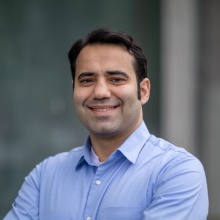The prestigious Stuart R. Wenham Young Professional Award recognizes researchers who have made a groundbreaking scientific contribution in the field of photovoltaics. The award is presented annually at the IEEE-PVSC (Photovoltaic Specialists Conference), one of the world's most important meeting places for the photovoltaic industry and research. The prize has only been awarded to a German researcher once before, in 2014. In 2024, ten years later, the Stuart R. Wenham Young Professional Award will now go to Stuttgart.
Prof. Michael Saliba, Head of the Institute for Photovoltaics (ipv) at the University of Stuttgart, accepted this year's award at the 52nd PVSC in Seattle on June 10. Saliba is researching cost-effective materials for highly efficient solar cells. The perovskite materials that he played a key role in developing are regarded as a promising breakthrough for sustainable energy production.
Cost-effective, versatile and highly efficient: Perovskite-based solar cells
Perovskites are a new class of semiconductor. Perovskite thin films can be created from a solution and applied to surfaces as "solar paint", for example, where they function in solidified form as highly efficient solar cells. "Flexible, lightweight and foldable solar cells based on perovskites could also be used in cars, in space travel or in sensors for the Internet of Things in the future," says Saliba. Combining perovskites with silicon demonstrates significant potential for creating highly efficient tandem solar cells. By leveraging the strengths of both materials, the efficiency of solar cells can be significantly enhanced.
Among other things, Saliba is currently investigating how perovskite thin films form. The new findings should make perovskite solar cells significantly more efficient and durable. For the LOCAL-HEAT project, Saliba received a 1.5 million euro ERC Starting Grant from the European Research Council (ERC).
About Prof. Michael Saliba
Prof. Michael Saliba received his PhD in Oxford in 2014 and is a leading expert in the field of metal halide perovskites. After holding positions at the École polytechnique fédérale de Lausanne, the University of Fribourg and TU Darmstadt, he was appointed at the University of Stuttgart in June 2020, where he currently heads the Institute for Photovoltaics (ipv). In 2022, he received an ERC Starting Grant for his innovative perovskite research.
The Stuart R. Wenham Young Professional Award adds to the long list of accolades received by Michael Saliba, including the renowned Heinz Maier-Leibnitz Prize from the German Research Foundation (DFG), the Curious Mind Award from Merck, the Helmholtz High Impact Award, and the Kavli Award from the Materials Research Society (MRS). Clarivate Analytics recognized Saliba as a "Highly Cited Researcher" in 2023 for the sixth consecutive year, placing him in the top 1% of the world's most influential researchers in the world.

Lena Jauernig
Editor Research / Early Career Researchers



